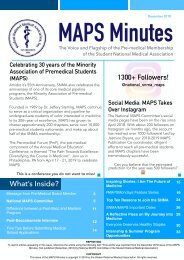JSNMA SUMMER 2019 Sneak Preview
You also want an ePaper? Increase the reach of your titles
YUMPU automatically turns print PDFs into web optimized ePapers that Google loves.
32 Scientific Focus<br />
DEAR MAN: A TRAUMA-INFORMED<br />
APPROACH TO ADDRESSING<br />
RACISM IN THE CLINICAL SETTING<br />
Roy Collins, MPH 1 ; Nia<br />
Johnson 1 ; Felisha Perry-<br />
Smith 1 ; Albert Kombe 1 ;<br />
Alauna Curry, MD 2<br />
Abstract<br />
Background Many healthcare providers express<br />
discomfort with exploring the topic of racism within<br />
the patient care setting. Even in environments where<br />
cultural competence training is present, providers<br />
are often ignorant to institutional oppression at<br />
large. They are often inadequately trained to make<br />
significant improvements to an otherwise oppressive<br />
system for diverse patients. As a result, empathy—a<br />
means for providers to gain the perspectives of<br />
their patients—is lost. The desired outcome of our<br />
workshop was utilization of empathy, applied such<br />
that participants can effectively address racial<br />
trauma and communicate using evidenced-based<br />
techniques: Describe, Express, Assert, Reinforce,<br />
be Mindful, Appear confident, and Negotiate (DEAR<br />
MAN). The research question is centered around<br />
the efficacy of the workshop in improving empathetic<br />
skills.<br />
Methods The researchers adapted a presentation<br />
originally provided to mental health providers into<br />
a student-led workshop during a Health and Social<br />
Justice Conference held at Saint Louis University.<br />
It included a slideshow presentation and smallgroup<br />
discussions where presenters and attendees<br />
explored the complexities of racism in healthcare,<br />
gave anecdotal experiences relevant to racism and<br />
discrimination, and developed practical strategies<br />
for improving communication. Attendees included:<br />
medical students, physicians, nurses, and social<br />
workers affiliated with the university. Surveys<br />
consisted of pre- and post-workshop questionnaires.<br />
Each survey recorded the participants’ demographic<br />
information and self-assessments in utilizing empathy<br />
1<br />
Saint Louis University School of Medicine,<br />
MD Candidate<br />
2<br />
Baylor College of Medicine<br />
by assessing their comfort level in identifying and<br />
addressing racism in the clinical setting. Data was<br />
analyzed using SPSS.<br />
Results The surveys showed demographics that<br />
suggest moderate diversity among the participants.<br />
The pre-test survey showed that the reported comfort<br />
level for addressing racism with a patient of a different<br />
race varied significantly by the participants’ race and<br />
generation, and also showed that the reported level of<br />
the importance of addressing racial trauma in clinical<br />
practice differed by the participants’ generation and<br />
religion. Post-test data showed that the participants’<br />
comfort with the concept of empathy varied by<br />
income, gender, race, and religion. Comfort using<br />
DEAR MAN skills differed by the participants’ income,<br />
race, and profession; while their likelihood for future<br />
incorporation of these techniques varied by gender<br />
and religion. In comparing the two questionnaires,<br />
participants showed modest improvement in their<br />
comfort level for addressing racism with patients<br />
independent of their race, and also in their comfort<br />
with responding to the psychologically traumatizing,<br />
racial interactions their patients report in the clinical<br />
setting.<br />
Conclusions The results suggest improved utilization<br />
of empathy in addressing racism and responding to<br />
its psychological trauma. Limitations include selection<br />
bias and sample size. Overall, this workshop shows<br />
promise as a tool for empathy-based training<br />
designed to positively impact physician behaviors.<br />
J o u r n a l o f t h e S t u d e n t N a t i o n a l M e d i c a l A s s o c i a t i o n






